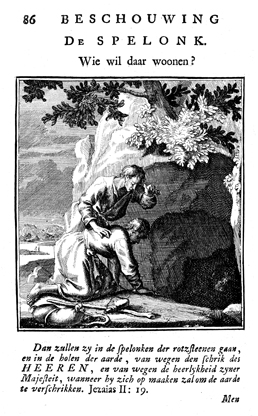The Cave: Who Wants to Live There?
Author: Luiken, Jan, 1649-1712
Image Title: The Cave: Who Wants to Live There?
Scripture Reference:
- Isaiah 2 (further images / scripture text)
Description: Two men peer into the dark entrance of a cave. A river can be seen in the background. The Dutch artist and poet Jan Luiken (1649–1712) was responsible for drawing this emblem and composed the poem that accompanies it. The etching was executed by Jan Luiken or his son Casper Luiken (1672–1708), who had used this image in an earlier work, which may be found in the Digital Image Archive under the call number 1699Weig. The attendant scripture text is Isaiah 2:19.
Motto: One seeks the fruit, From the open air.
Poem:
The dismal Hole represents Hell:
The Hole is a hidden dwelling,
That lacks the splendor
Of earthly and heavenly scenery:
So the Cave suffers eternally,
Hidden below the heavenly presence,
Lacking the Light that shined eternally,
And all Beauty, never fully praised.
If someone lay deep below the light sky,
Swallowed up in the hollow stomach of the earth,
How high would his desire rise,
If somewhere a release were found!
Careless human Soul,
Captive in the World’s deep Cave,
Shackled to the sinful flesh and blood,
Where does thy view and desire remain?
Should a rope descend from above,
And wish to pull thee out of the abyss,
Seize the means presented,
Before thou dost sink still deeper;
When the cracks in thy ground
Through the deadly earthquake,
Devoured thee in the hellish hole,
And took thee away from the Eternal life.
O Man! O! Man extend thy hand,
To the rope offered by heaven.
SECOND:
As a Dungeon being a dark cave,
Deep under the earth, where neither Sun nor Moon shined,
Mourns with its prisoner, while the merry chorus,
Resides above it in the Royal house,
Because he is concealed so low in the Foundation,
Hidden from help or comfort, in oblivion:
So Hell leads, the Hole, of desperate holes,
Concealed deep under the joyful court of God’s Kingdom.
Therefore, O man! take heed as it may happen to thee.
Still art thou free, and art in thy day of life,
Place thy feet well, and avoid, like the plague, the paths,
Which lead to that dismal hole of the abyss,
Though they pass joyfully through a valley of roses.
Thou art no animal, but canst understand the hidden layer.
Use thy humanity, and nobility of reasoning,
To tread rather along the path of thistles,
That promises glory at its early end,
The brilliance of which dulls the clear light of thy understanding.
That Garden of joy and endless treasure,
The delight and elegance of which the mind cannot imagine.
O Man! thou dost still stand beautifully, although half way,
On the trail, that deliberation, only renounces continuing.
Because why would thou, for brief rejoicing,
Lead thyself into the hole of desperation?
No, it is better for thee, following good advice,
To avoid the Dungeon in the Palace of salvation.
(Translation by Josephine V. Brown, with editorial assistance from William G. Stryker)
.
Click here for additional images available from this book.
Request a high-resolution file (fees apply)
Rights Statement: The online edition of this work in the public domain, i.e., not protected by copyright, has been produced by Pitts Theology Library, Emory University.
Rights Status: No Copyright - United States
Pitts Theology Library provides copyright information as a courtesy and makes no representation about copyright or other legal status of materials in the Digital Image Archive.

